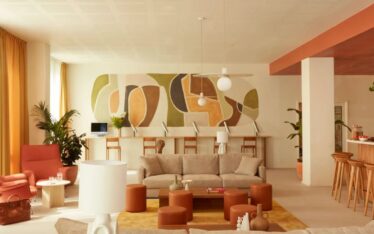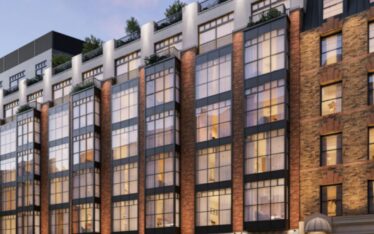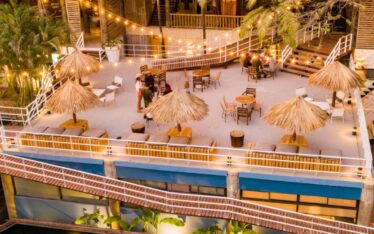Tur Experiences is a new kind of hospitality company on a mission to improve the well-being and happiness of people and the planet. The Outdoor Hospitality operator and brand for sustainable accommodations offers meaningful escapes to sustainable, off-grid micro-cabins close to your home and surrounded by nature. The model provides an opportunity for local landowners and hotels to create extra income and be part of the global green transition while offering cool, sustainable accommodations to travellers.
After being inspired during the pandemic to do things differently, founder Reinier Van Der Veeken created the concept by combining his passion for nature and conservation with over a decade of international experience in the hospitality real estate industry.
We sat down with founder Reinier to find out more about Tur Experiences, his mission for the future and how hospitality can be a force for change…
What led you to start Tur Experiences?

My passion for conservation and wildlife actually began during my time travelling on the African continent and this – combined with my love of the outdoors – was what inspired me to start Tur Experiences.
I used to work for large hotel companies – such as Starwood, Hyatt, and Belmond – where I worked in feasibility doing financial analysis as well as business development for new hotel projects in Europe, Africa and the Middle East. I was privileged enough to travel a lot, meet lots of people and experience different cultures.
But when Covid hit, it gave me time to pause and reflect – like many of us, and I started to ask myself some big questions like “What am I going to do next with my life?” and “Where can I have the biggest impact?” I knew I wanted to merge my career with my interests and values so I put pen to paper and Tur Experiences was born.
Can you tell us about the concept behind Tur Experiences and how it differs from more traditional forms of hospitality?
At its core, Tur Experiences is a positive-impact hospitality company. We work with unique, sustainable accommodations in nature located within a two-hour radius of big cities around Norway but we have plans and ambitions to expand over Europe.
We are very much focused on a short-supply chain, with everything as local as possible. We partner with local landowners where we lease land from and give them the opportunity to diversify their income.
We made a conscious decision to have the cabins built in Norway, using reused material and clean technology to make them off-grid. From the start, we have been working very closely with the community and have the environment and community in mind with every decision we make. I think that makes us quite different from other concepts and I hope we can inspire others to follow a similar path.
What is the big mission behind the company?
Ultimately, we want to improve the well-being and happiness of people and the planet. We believe that hospitality can be a really great platform for positive change, helping people get out in nature and letting them reconnect, which helps improve their well-being both physically and mentally. We also hope to inspire people to make positive changes in their daily lives. Hopefully, through these things, we can make the world a little bit better.
Why was it important to you to create a model that would give back to the community?
I think you really have to give back to the community and the environment – especially with the state of the world right now.
As cliche as it may sound, the pandemic gave me the time to step back and think about how I’d like to do things differently. As a starting point, I wrote down the values that are important to me which I later incorporated into the concept. When you do something for yourself or when you’re having an entrepreneurial journey, your company values are intertwined with your personal values.
For me, my passion for conservation and nature was really important, having supported certain projects in Africa for anti-poaching for many years. I also help out once a month on an organic farm in Oslo that uses regeneration as a practice, learning about organic farming and what regeneration means within agriculture. It’s really interesting. I took my son there on a harvest day. He loved it. He just picked up the carrots from the ground and he still talks about it because he has experienced where our food actually comes from. And friends asked me like, “Hey, where is this? Can we join next time?”
That made me realize that a lot of people, especially in the city, want to learn about these things and be part of it, whatever the reason may be, but they have no access to it.
Can you tell us more about your first site and when you are planning to welcome guests?

Our first site is less than two hours from Oslo in a hilly forest area. This particular location is in a municipality that is not currently well known for tourism but it’s extremely beautiful and has a lot of adventure and outdoor activities available.
We look for locations where guests don’t drive right up to the cabin – instead, we invite people to walk to get there. Then it’s pure nature. From the cabin, you have an amazing view over the valley mountain ridges and there is a national park just next door with an abundance of nature.
We’ve worked very closely with the local landowner as well as the municipality and several landowners bordering our site to make sure that everybody’s happy with the plans and can give input. We plan to place three secluded, self-sufficient cabins here, located about 50 metres apart so you don’t see each other once you’re in the cabin.
What kind of experiences can your guests expect when they’re there?
It always starts with planning and getting excited about the trip. The name Tur Experiences actually refers to a Norwegian sentence called ‘å gå på tur’ and that means to go on a trip in nature.
We have a concept that we like to call “Adventure Chill”, so our cabins are in locations where you can do cool adventures or just relax. For example, our first location is famous for mountain climbing, but there are also a lot of hiking routes, mountain biking and kayaking possibilities. Or guests can opt to chill in the cabin, do some cooking, read, hang out in a hammock or do nothing. It’s all about balance.
Can you tell us a bit more about how Tur Experiences are going to have a positive impact on local communities and existing businesses around your sites?
I look at us as a kind of spider in a web. It doesn’t make sense to go to a new place and set up everything new yourself. You can look at the existing infrastructure, what the place can already offer and what we can offer to help those already there.
Often we are in places where there is very limited accommodation. We help existing adventure companies by bringing them additional business through our guests. For the landowner, we provide them the opportunity to create additional income via a revenue-sharing partnership. We also help to create jobs for the local community.
In addition, we will set aside at least 1% of our revenue to give back to local conservation initiatives. Besides just giving money, we actually want to participate and get our hands dirty, learn and also invite guests to take part in those events and really make that connection.
We also try to get everything as local as possible, for example, our building partner is located 10 minutes from the first site so the cabins help a local existing company. All the wood and reused wood come from a 50km radius, so that’s also very local. Those are examples of how we help the local community
How do you ensure that the cabins have a minimal impact on the environment and that they’re self-sufficient?
One of the things we made an early decision on was to have the cabins built in Norway instead of in other countries and then transport them all the way to Norway. That already saves a lot.
Another is the type of materials we use and trying to get them as much local and organic as possible and also reusing as much material as we can. So, for the first cabin, we have around 50-60% reused wood from an old barn in the area. All of that helps to create a positive impact and reduce our emissions because we’re not using any new resources.
Also, the way we place the cabins – they’re movable and we don’t need to be connected to the public grid. We don’t need to open the ground for any heavy infrastructure work. We’re also not creating any roads, no sewage whatsoever. That’s another way where we make sure that we have the least impact possible.
There will always be some impact, it’s not possible to have no impact, but we’re really focused on low-impact architecture with the least disruption to the environment.
What do you expect your biggest kind of guest segments to be?
There are a number of different target groups that we can cater to. I think most people live in the cities close by, hence the radius of 2-3 hours. We want it to be a place where people don’t just go once, but several times and for longer periods, to spend more time in nature and get the benefits thereof.
It can be different ages from what I’ve seen so far from people on the waiting list, it’s quite a wide range. Some are individuals, some are interested as a couple or friends and, quite interestingly, also small families.
What I wanted to create was a place where I can go myself or with my girlfriend or with my family to just completely disconnect. So a place where all these different groups with all very similar values can go to reconnect with each other, do something good and learn more about nature.
How do you see Tur Experiences evolving in the future?
We’re a young company, so things change. I see multiple roads for the future. I think on one hand we can operate unique, sustainable cabins that we have designed ourselves in off-grid locations like we’re doing with the first location, but we can also partner with hotels and landowners who would like to either add sustainable accomodations to their property and/or start a sustainable accomodation business.
We can also selectively enter into distribution partnerships with existing unique companies that follow the same philosophy, the same values as we do, but maybe need some extra support from a marketing and distribution point of view.
Also, besides looking at our own design or other people’s design when we look at new build locations, we also look at repurposing existing structures. So think about old boat houses that have been run down and neglected or an old forest cabin where we can renovate in an authentic way, using reused material and putting our concept, brand and management on as well. Those are items and opportunities we also look at.
So with the accommodation portfolio of Tur Experiences we can take different routes that coexist very well together, I believe.
In terms of the positive impact that we’ve spoken about, how will you measure the success of achieving that mission over time?

There are a couple of examples where I think we can measure it – one is the amount of time we can get people to spend in nature and then also how often they how often they come back to us. I think that’s where we can have a really big impact.
In addition, of course, is the amount of reused material we use on the construction side where we can measure our impact. And also how many landowners we help to create an additional income and additional jobs. I think those are quantifiable examples where we actually can measure our positive impact in the future.
We actually hired a third-party company to do a climate assessment of Tur Experiences and that was super interesting because they quantified our approach, our thinking, and our strategy that we’ve been setting up so far. They came to the conclusion – taking into account the way we transported cabins, where they will be built, how they are built, the material selection, the reused material, the clean technology to make it off grid, etc. – is that we actually become a positive business within four years.
Due to the significant usage of reused materials, local production and the use of renewable energy sources, we have created not only a cool cabin design, but also one that is sustainable and aligned with the 2030, 1.5°C strategy.
There are also a lot of other positive impacts that are harder to measure, such as how do people feel after they spend two, three nights in nature? What’s their difference in mood? How is it impacting them in their daily lives? What changes have they made in their daily lives after spending a couple of nights in nature and learning certain things?
We’ve seen so many changes in hospitality, especially in the last three to four years. How do you see the future of hospitality evolving over the next decade?
I believe that people are going to be much more conscious of where they spend their money, especially when it comes to experiences and adventures which is already a trend that has been going on for a long time. I truly think that people are going to look more at how a company is set up, where certain things are procured, the supply chain, how it is built and the impact on the community and on the environment.
Taking that into account, guests are looking for holidays or getaways where they can actually have a positive impact. Also, with what’s going on in the current global state, that’s going to fast forward big time. You already see that happening in retail companies and other industries, but hospitality is always a little bit behind.
I think we are at the forefront of this because this is exactly what we’re creating and why we’re setting up Tur Experiences.
When do you welcome your first guests?
Our first locations are underway around Oslo and Ålesund, and we are focused on further expansion in Norway and Sweden. We hope to welcome our first guests sometime next year. We are currently looking for property investors and strategic partners, as well as landowners and hotel partners who share our vision and values. Connecting landowners with travelers through sustainable accomodations. Please reach out if you are interested, I would love to hear more about you and how we could potentially collaborate.
We love how the hospitality industry is constantly evolving and it was a pleasure to chat with Reinier, find out more about his mission and learn about how Tur Experiences is using hospitality to create a positive impact in the world.
If you have a story to tell about positive hospitality or are in the early stages of developing your unique hospitality brand, we’d love to chat. Get in touch at hello@staythenight.net



